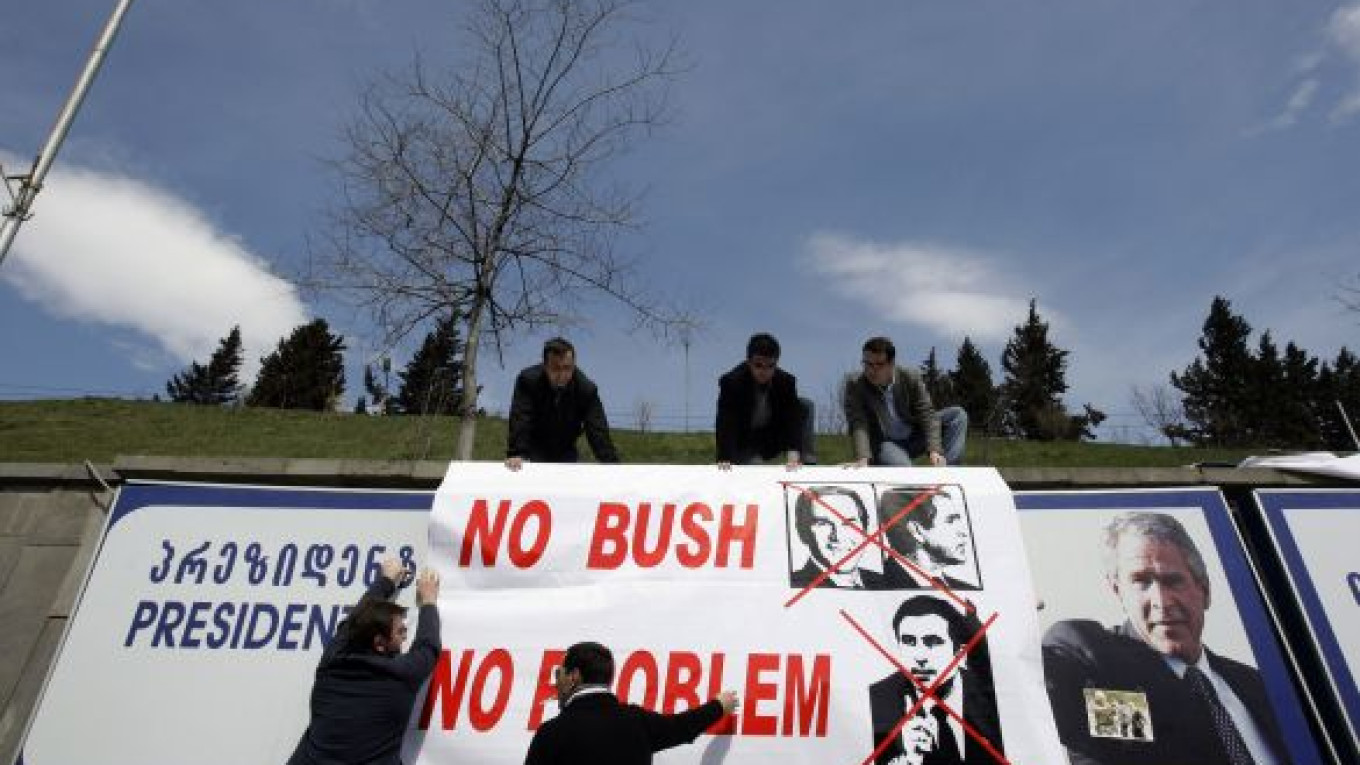The Pentagon plans to build military capabilities of Georgia and the three Baltic states to ready them for operations in Afghanistan, a move that could raise alarm in Moscow.
The Pentagon announcement Friday came the same day that U.S. President Barack Obama and President Dmitry Medvedev sealed an agreement on a landmark nuclear arms reduction treaty that they are to sign on April 8 in Prague.
Russia and Georgia fought a brief war in 2008, and U.S. officials have acknowledged tensions with Moscow in the past over similar programs to bolster the military capabilities of Russia's neighbors.
In notifications sent to Congress, the Pentagon said military assistance programs for Georgia, Latvia, Lithuania, Estonia, Croatia and Hungary were designed to build their capacities "to conduct stability operations alongside U.S. forces in Afghanistan," Pentagon spokesman Bryan Whitman said.
Russia defeated Georgia's military bid to retake a pro-Moscow region from rebels in a five-day war that rekindled tension between the Kremlin and the West.
Russia has since accused Washington of rearming the Georgian "war machine." Because of the sensitivities, Pentagon officials have said they have consulted with Russia about the military programs with Georgia.
Despite efforts by the Obama administration to shore up relations with Russia, tensions remain, including over France's recent decision to sell an advanced warship to Moscow.
Russia asked to buy the 21,300-ton, Mistral class warship to modernize hardware that was exposed as outdated during its war against Georgia.
U.S. Defense Secretary Robert Gates protested the sale during a recent visit to Paris, arguing that it could stoke tensions with key U.S. allies, especially Georgia.
The Mistral is an amphibious assault ship able to carry helicopters, troops, armored vehicles and tanks.
The Georgian-Russian region is viewed by the West as a vital energy transit route from the Caspian to Europe.
Along with the programs for Georgia and the Baltic countries, the other military programs to be led by the Pentagon are designed to help Yemen and the Philippines battle militants.
Georgia and the Baltic states have been key supporters of U.S.-led military operations against terrorism in Afghanistan.
Separately, a dispute between Tajikistan and Uzbekistan has caused a bottleneck in the shipment of some nonmilitary supplies destined for the U.S.-led forces in Afghanistan, Tajik officials said Friday.
Tajikistan says freight traffic is being blocked from crossing its border with Uzbekistan, holding up many shipments, including the Afghanistan-bound supplies. Tajiks say the action has severely damaged their economy.
Some analysts say Uzbekistan has halted traffic because it fears that a huge dam project in Tajikistan will divert water from its territory. Uzbekistan denies that the interruption in railway deliveries is intentional.
Under deals secured last year, Uzbekistan and Tajikistan granted the United States and NATO forces permission to transport nonmilitary materials through their countries to neighboring Afghanistan.
Tajik officials say about 1,000 railway carriages transporting goods to Tajikistan for an important aluminum company and the giant Roghun hydroelectric dam construction project, as well as fuel needed for agricultural machinery, have been affected.
Tajikistan's state railways company says some of the railcars are also carrying supplies bound for international forces in Afghanistan.
(Reuters, AP)
A Message from The Moscow Times:
Dear readers,
We are facing unprecedented challenges. Russia's Prosecutor General's Office has designated The Moscow Times as an "undesirable" organization, criminalizing our work and putting our staff at risk of prosecution. This follows our earlier unjust labeling as a "foreign agent."
These actions are direct attempts to silence independent journalism in Russia. The authorities claim our work "discredits the decisions of the Russian leadership." We see things differently: we strive to provide accurate, unbiased reporting on Russia.
We, the journalists of The Moscow Times, refuse to be silenced. But to continue our work, we need your help.
Your support, no matter how small, makes a world of difference. If you can, please support us monthly starting from just $2. It's quick to set up, and every contribution makes a significant impact.
By supporting The Moscow Times, you're defending open, independent journalism in the face of repression. Thank you for standing with us.
Remind me later.


